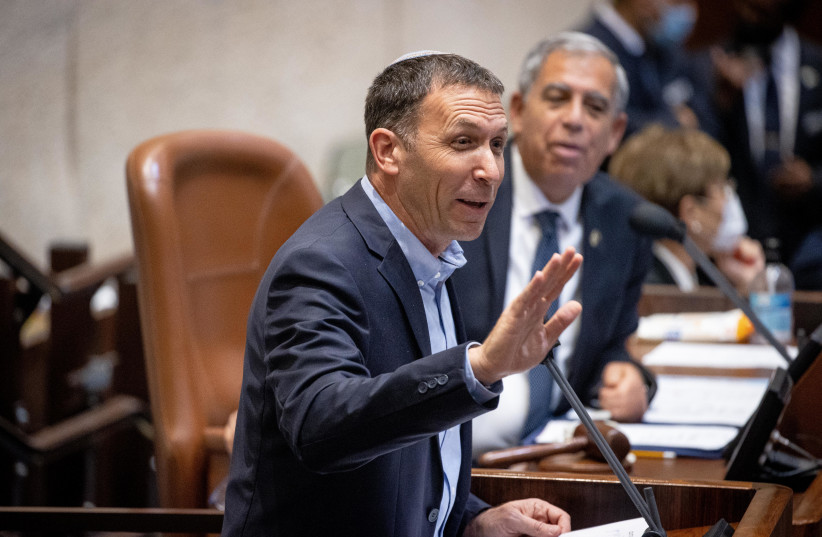Ashkenazi Chief Rabbi David Lau threatened on Tuesday to stop approving conversions if the government’s plan to reform the system for Jewish conversion is passed.
Lau opposes plans to end Rabbi Moshe Weller’s role as head of the Conversion Authority because he operates according to Lau’s instructions, saying that to listen to the chief rabbi is exactly Weller’s role.
In a letter to Prime Minister Naftali Bennett last week, Religious Services Minister Matan Kahana stated that he had spoken with Weller and that because Lau is against the conversion reform plan and Weller follows his instructions, the rabbi “is not the correct person to lead the Conversion Authority.” Kahana recommended that Weller not continue in his position after January 2.
Lau warned that ending Weller’s service in his position would “severely damage” the function of the authority. “Beyond the harm to the continuous work of the Conversion Authority, ending the term of someone who worked to implement halachic [Jewish law] directions cuts off the connection between the Conversion Authority and the Chief Rabbinate, and will cause a disconnect and removal of halachic responsibility from everything that is done in the conversion system.”
The chief rabbi called the decision a part of the “dangerous trend” of the planned reforms to the conversion system. Lau warned that the reform plan would cause a “significant rift” among the Jewish people and would require future generations to deal with the difficult question of “who is a Jew.”

Lau called on Bennett to halt the conversion reform, warning that if it is not halted, the conversion system in Israel would grind to a halt, and he would immediately stop approving conversion certificates.
The chief rabbi has previously called the plan a “spiritual disaster and a serious injury to the Judaism of the State of Israel.”
SHAS CHAIRMAN Arye Deri welcomed Lau’s statements on Wednesday, calling the decision to stop approving conversion certificates “correct and just.”
“Promoting a fake conversion scheme will hurt those who want to convert and cause them fraud and sorrow,” said Deri. “The Shas movement supports the resolute stance of the chief rabbi, who guards the vineyard of the House of Israel and prevents the gates of entry into the country from being breached by foreign elements.”
Finance Minister Avigdor Liberman responded to Lau’s statements in a letter to the chief rabbi on Wednesday, stressing that his statements were “an implied threat, not to mention extortion through threats.”
Liberman added that the decision to appoint or remove the head of the Conversion Authority was in the hands of the relevant government authorities. The finance minister stated that Lau is required to carry out his duties as long as he is in his position as chief rabbi.
The finance minister warned that if Lau carries out his threats, it would cause real harm to the Israeli public and especially IDF soldiers, Ethiopians and those wishing to convert. It would serve as “improper behavior” for Lau’s position, he said, which could lead to the government taking steps to remove him as chief rabbi.
In the Knesset plenum, United Torah Judaism MK Moshe Gafni responded to Liberman’s comments with outrage, saying “Liberman is cheeky and on the verge of antisemitism to threaten to fire the chief rabbi just because he stated his opinion. The chief rabbi will do what the Torah requires of him. Rabbi Lau will not rule according to what you want, but according to what the Torah requires. You are zeros, and those like you should take off your shoes when you talk about a chief rabbi. Brats.”
ALIYAH AND Integration Minister Pnina Tamano-Shata demanded that Bennett intervene in the issue immediately, warning that if Lau carries out his threats, it could cause serious harm to new immigrants who are undergoing the conversion process.
“Needless to say, the new immigrants required to complete the conversion proceedings are mostly a weakened group, which has left behind its entire world and property, and therefore stopping the issuance of conversion certificates and conducting political battles at their expense is a serious and disproportionate violation,” she stressed.
On Wednesday, Kahana and Yisrael Beytenu MK Yulia Malinovsky agreed that a bill from her party concerning the conversion system would be put on the agenda for a discussion in the Knesset plenum, but that the vote and Kahana’s memorandum on the law would be postponed for two weeks.
Kahana’s planned reform of the conversion system has received support from a series of National-Religious rabbis, including the roshei yeshiva (religious school heads) of Yeshivat Har Bracha, Yeshivat Har Etzion, Yeshivat Mahanayim and the hesder pre-military yeshiva in Otniel. However, other National-Religious rabbis, as well as rabbis from the haredi sector, have expressed opposition to the plan.
The reform plan being pushed forward by Kahana aims to make conversion more accessible, and would allow the municipal chief rabbis to establish conversion courts and use leniencies in Jewish law to convert citizens who are of Jewish descent but are not Jewish according to Jewish law.
Kahana’s proposals include forming a rabbinical committee after legislation is passed that will determine the parameters under which the conversion courts established by municipal chief rabbis will operate.
His legislation also grants the chief rabbis and the Council of the Chief Rabbinate the power, under certain circumstances, to revoke the appointment of a rabbinical judge on the new conversion courts.
